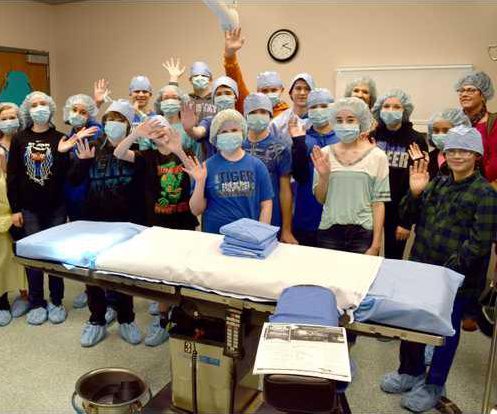SPOTLIGHT ON SHELLY SCHNEIDER
Title
Administrator for the Barton County Health Department
Residence
Rural Barton County for 19 Years.
Family Members
Husband with two children.
Hobbies
Coaching volleyball and softball.
What drew you to this work/service?
Wanted to be a nurse.
What do you enjoy most about what you do?
The diversity of the job.
How has it changed since you first began?
Computer programs and KDHE has changed their procedures a lot.
What changes do you anticipate in the next 5-10 years?
I can see changes that will affect not only the local way we provide healthcare, but also big changes on the State and Federal level. Just the changes in technology alone will be difficult with the limited amount of funds available to provide it. Many changes in the way programs are being delivered.
Shelly Schneider assumed the Administrator/Director role in August 2014 at the Barton County Health Department.
Schneider had inherited a great wealth of experience with the employees.
With the help of her staff and this combined knowledge they share has helped the BCHD reach people of Barton County in many different ways.
The newest way is a new program called Pregnancy Maintenance Initiative.
“If the Health Department hadn’t been in such a good position when I took over, I wouldn’t be able to find new avenues to explore and new programs to add.” Schneider said.
This program was started in 2015 and it begins with pregnancy and supports mom until baby is six months old.
Women who are pregnant and receive WIC can qualify for PMI.
Once needs and strengths are discussed with the pregnant woman, goals are introduced. Additionally, pregnant women who complete classes on SIDS, breastfeeding, PURPLE Crying, healthy eating and other subjects earn incentives.
The incentives include: diapers, wipes, sleep sacks, diaper bag and other helpful items for new mom and baby.
“The benefit of this program is to have positive pregnancy outcomes,” Schneider said. “It also insures they have prenatal care and we can refer them if needed to other programs that are out there.”
The BCHD did not want to leave out the elderly population, so in 2015 they developed a way to dispose of unwanted, outdated, or no longer needed medications.
Clients are able to bring in their medications and a nurse will sit with them in an exam room and help them dispose of the medications in a bag full of kitty litter or used coffee grounds.
“The public can do this at home as well, but there is some kind of reassurance in having a nurse help them,” Schneider said.
Once the medications are put into the baggie, they can be disposed of in the regular trash.
Other Programs that are available at the BCHD include:
• Women, Infants and Children program
This is a supplemental food program for women, infants and children that serve clientele who meet program criteria including income guidelines.
Pregnant women, women who recently had a baby and children up until age 5 may qualify.
WIC provides nutrition and breast feeding education, specific foods to meet nutritional guidelines and referrals for other services.
Barton County Family Planning Program.
This services enable individuals, including minors, to determine freely the number and spacing of their children and to select the means by which this may be achieved. Barton County Public Health Nurses facilitate positive client responses to normal development; promote sexual health and safety including a healthy environment; intervene with actual and potential health problems; provide case management services; and actively collaborate with others to build individual and family capacity for adaptation, self-advocacy, and learning.
• Child care licensing program
The purpose of this Program is to safeguard children from harm in out-of-home child care and reduce predictable health and safety risks to children in child care facilities. This is done by providing required orientation to providers, conducting annual inspections of each facility and investigating complaint surveys at facilities.
According to Schneider. BCHD has been awarded many KDHE grants, such as: Maternal Child Health, Pregnancy Maintenance Initiative, Public Health Emergency Preparedness, Immunization Action Program, Child Care Licensing, Chronic Disease Risk Reduction, Family Planning, Heathy Start Home Visitor, Ebola Preparedness.
In addition to these grants, BCHD also performs outreach services to the county.
The BCHD is not just about immunizations, BCHD professional nursing staff provides a multitude of services ranging from investigating reportable diseases, providing women’s/men’s health services, assisting with exams, providing contraception, testing for STI’s, educating on various topics.
BCHD also performs tuberculosis testing and treatment, providing immunizations for all age groups, including foreign travel vaccines, HIV testing, maternal and infant support, staying abreast of emergency preparedness requirements/trainings.
Clients are provided with resources as needed and referrals are made if indicated.
According to BCHD. Public health protects and improves communities by: preventing epidemics and the spread of disease, promoting healthy lifestyles for children and families, protecting against hazards in homes, work, communities and the environment, assuring high quality health care services, and preparing for and responding to emergencies.
There is little of daily life not related to or influenced by public health.
Public health is everywhere.
The interesting part of all of this is that the needs haven’t really changed, just the way the services are delivered.
Times are changing, and the faces of public health will change as well.
“I believe that we need to stay in touch with our community to make sure that we are hearing their needs, and to make sure we can provide the means to meet their needs,” Schneider said. “As a community, we must make sure that everyone is able to receive the care and/or assistance that they need. We are an aging community, so we need to make certain that we can meet all the needs of the County, both young and aged alike.”
For more information about these programs call the BCHD at 620-793-1902.





